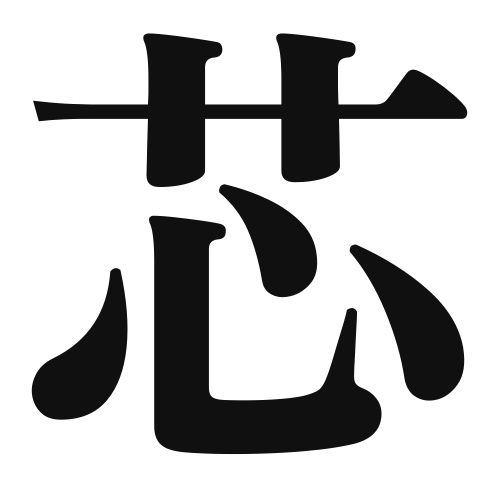1. Overview of Meaning
The kanji “芯” (shin) primarily means “core” or “heart.” It refers to the innermost part of something, often symbolizing the essential or fundamental aspect of an object or concept.
2. Formation and Radical
Formation of the Kanji: The kanji “芯” is a phonetic compound (形声文字), combining the radical for “wood” (木) on the left, which relates to the idea of something being solid or foundational, and the phonetic component “心” (shin), which means “heart” or “mind.” This combination suggests the idea of the core or heart of a wooden object.
Radical: The radical of “芯” is 木 (tree), indicating its connection to nature and solid materials.
3. Examples of Usage
Common Words and Phrases: Some frequently used words that include “芯” are:
- 芯材 (しんざい, shinzai) – core material
- 芯のある (しんのある, shin no aru) – having substance or depth
Example Sentences in Daily Conversation:
- この木の芯はとても硬いです。 (Kono ki no shin wa totemo karai desu.) – The core of this wood is very hard.
- 彼女の考えには芯がある。 (Kanojo no kangae ni wa shin ga aru.) – Her thoughts have substance.
4. Synonyms and Antonyms
Similar Kanji: A similar kanji is “心” (shin), which means “heart” or “mind.” While “心” refers more to emotions and thoughts, “芯” emphasizes the physical core or essence of something.
Antonyms: An antonym could be “外” (がい, gai), meaning “outside” or “external,” which contrasts with the idea of “芯” as the inner core.
5. Cultural and Historical Background
Connection to Japanese Culture: In Japanese culture, the concept of “芯” is often associated with the idea of having a strong inner character or integrity. It reflects the importance of being grounded and having a solid foundation in one’s beliefs and actions.
Proverbs and Idioms: One relevant proverb is “芯が強い” (しんがつよい, shin ga tsuyoi), which means “to have a strong core,” often used to describe someone who is resilient and steadfast in their principles.
